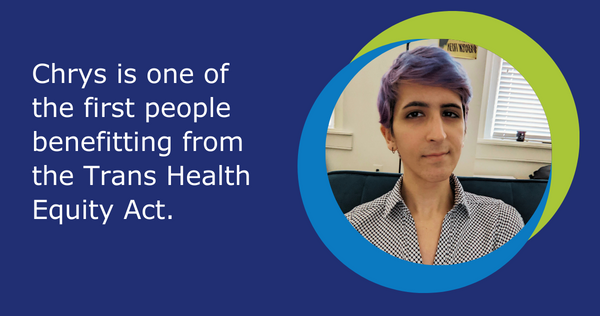
The laws and policies enacted each year during the Maryland legislative session heavily impact our daily lives. Last year, DRM and Chrys, as members of the Trans Rights Advocacy Coalition, successfully advocated for the passing of the Trans Health Equity Act, a law requiring Medicaid to cover gender affirming care.
Chrys is one of the first people benefitting from the new law. We sat down with Chrys to hear what motivated them to advocate for the bill and how their life has changed since it passed. Here is their story.
Chrys is a college student with a passion for the humanities. They’ve always been deeply interested in understanding why people think and act the way they do. A non-binary, gender-fluid person, Chrys is heavily involved in legislative advocacy around trans rights and community building, such as hosting picnics for trans people in the Baltimore area.
Before sharing with their older brother, “I think I might be trans”, Chrys was closeted and people assumed they were a man. In their mid-twenties they found themself increasingly questioning their gender. Chrys thought, “Maybe it’s not normal that I hate all of these things about myself that define what a man is supposed to be.”
Days when their ADHD doesn’t allow them to shave, they are misgendered and often met with discrimination and harassment. “There’s a big disconnect between who I see in the mirror and who I want to be. It’s very jarring especially because I still need to shave every day.” Experiencing gender dysphoria is a barrier to enjoying life to the fullest and connecting with those around us. This is one reason why many transgender people need gender affirming healthcare.
To align their physical appearance with their true identity, Chrys needed gender affirming care, but it was not all covered through their Medicaid insurance at the time. They used loans and savings to pay roughly $3,000 for partial treatment.
Without gender affirming care, trans people are at a higher risk for anxiety, depression, suicide and violence. In a national survey on LGBTQ youth mental health, 54 percent of young people who identified as transgender or nonbinary reported having seriously considered suicide in the last year, and 29 percent had tried to end their lives (Gender Affirming Care, 2020). Many studies have shown that gender affirming care reduces these risks (Mental Health Outcomes, 2022).
To fight for equitable access to gender affirming care, Chrys joined the Trans Rights Advocacy Coalition, a group of advocates including DRM attorney, Sam Williamson. Chrys, alongside other members of the coalition, created one of the most comprehensive reviews of Medicaid policies on trans services across the United States. This research formed the backbone of the campaign for the Trans Health Equity Act. From coalition meetings, press conferences, testimonies, bill drafting, lobbying, and more, the Trans Rights Advocacy Coalition led the campaign for the passage of the Trans Health Equity Act in 2023. In January 2024, Governor Moore signed it into Maryland law.
Chrys is one of the first people benefiting from the Trans Health Equity Act. They will get facial feminization surgery and more hair removal newly covered by their Medicaid insurance. Chrys is relieved they won’t have to take out more loans. They are hopeful that after the procedures people won’t call them a man, discriminate against them, nor harass them for wearing a dress while having chin stubble. They look forward to waking up and smiling in the mirror and eagerly taking photos with friends.
Chrys’ story highlights why legislative advocacy is important in creating a more equitable Maryland for all.
DRM can only continue this work with your support. Give today!



